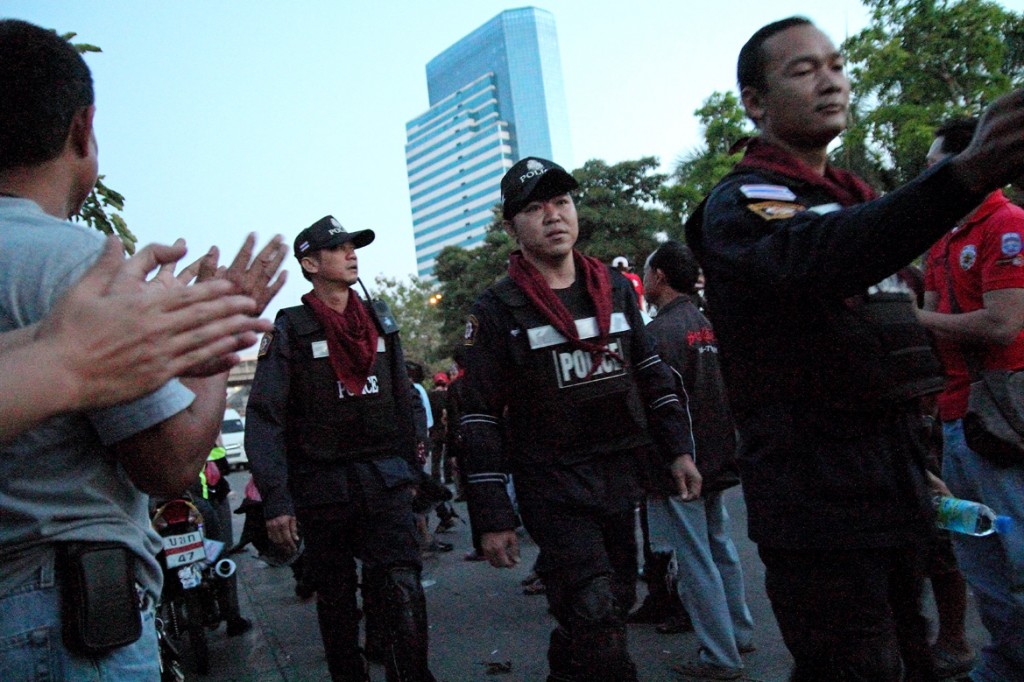In Thailand, victims’ rights to truth and justice were not at the center of claims against the passage of the amnesty that would have precluded any prosecution of, among others, those who committed gross violations of human rights since 2004.
Key for expanding the scope of those eligible for amnesty was the argument of the principle of equality. In this article I reflect on the allegation, by the House Committee scrutinizing the bill, that the exclusion of leaders from both sides from the scope of the amnesty infringed the principle of equality enshrined in Article 30 of the Constitution of Thailand.
Some have undervalued this allegation arguing the principle of equality was being violated anyway as no amnesty was granted for the offense of lèse majesté. This reasoning still does not challenge the core of the message: the need to widen the scope of those eligible for amnesty on the grounds of the principle of equality before the law. Eventually, there might be renewed attempts to pass an amnesty.
Section 3 of the amnesty bill, as amended by the House Committee, was intended to cover political offenses with the exception of the crime of lèse majesté, which is indeed a political offense. The reference to political crimes is to distinguish them from ordinary offenses. The bottom line is that an amnesty established as a response to national conflict or political crisis should not serve as a pretext for extinguishing criminal liability for persons guilty of ordinary offenses.
In order to scrap the paragraph excluding the leaders from the original amnesty bill, the House Committee alleged non-observance of the principle of equality before the law and enjoyment of equal protection under the law.
What follows is that amnesty has to be granted to everyone who has committed a political offense or, else, be considered discriminatory. But, is this accurate?
It might be appropriate to start examining what is an amnesty. Expert Mark Freeman defines amnesty as “an extraordinary legal measure whose primary function is to remove the prospect and consequences of criminal liability for designated individuals or classes of persons in respect of designated type of offenses irrespective of whether the persons concerned have been tried for such offenses in a court of law”.[1]
To start with, an amnesty is an exceptional measure as it interferes with the ordinary application of the law. Instead of enforcing the criminal code, the State decides to make an exception with regards to some individuals and for certain types of offenses.
Let’s start with the designated individuals. In principle, there is nothing wrong with granting amnesty to some individuals and not to others. However, there needs to be a justification to show that there is an objective and non-arbitrary basis for this exclusion, which the Thai amnesty bill failed to provide. In fact, the exclusion of “those who had decision-making authority or decisive authority or directed political movements” (as foreseen in the original bill) from the personal scope of application of the amnesty would be consistent with the principle of command responsibility, under international criminal law. Prosecutors of international and hybrid courts have used this principle to focus on those who are the most responsible and it provides a justification to exclude high-ranking officials from the scope of an amnesty.[2] Such a justification would invalidate any claim that the enjoyment of equal protection under the law has been impinged.
Notwithstanding the previous argument, some argue the amnesty should benefit everyone as it was granted with a focus on what happened during the events rather than on the individuals. In fact the Thai bill, as amended by the vetting committee refers to “All actions of persons or people that are related to political protests, political expression, political conflict”. As the focus of the amnesty is on the offenses committed, they argue, excluding the leaders infringes equal protection under the law. The focus, then, turns to the type of offenses.
The problem with the Thai bill is that it granted amnesty for actions related to political offenses without further defining this concept, or without providing a list of criteria to decide whether an action is associated with a political objective. The result is that it is not clear which are these actions beyond those offenses that are political by their very nature, such as rebellion, treason, sedition, subversion or membership in a banned political party, among others (or lèse majesté and hence the need to explicitly exclude it from the scope of the bill). The amnesty bill even implied that political offenses also encompassed economic crimes, as they were politically motivated.
Left with this vagueness, political offense comes to encompass each and every crime committed during political conflict. The argument here has evolved: as the amnesty covers all the offenses, everyone should benefit.
This justification misses an important point: amnesties should not cover gross violations of human rights. Such an amnesty would go against Thailand’s obligations under international law. The International Covenant on Civil and Political Rights, to which Thailand is a State party, compels states to ensure that, when rights are violated, individuals have accessible and effective remedies to vindicate these rights. The victim’s right to an effective remedy does carry an obligation for the State to investigate and, when evidence found, to prosecute those responsible.
Excluding those who committed gross violations of human rights from the scope of an amnesty does not infringe any equality principle. Rather it keeps domestic justice options open and results in a symbolic denunciation of those responsible. This might be the minimum that the victims deserve.
Carlos Fern├бndez Torné is currently studying a PhD on transitional justice and human rights, Universitat Aut├▓noma de Barcelona
[1] Freeman, Mark, Necessary Evils: Amnesties and the Search for Justice, New York, Cambridge University Press, 2009, p.13.
[2] A Group of Experts has recently drafted the “Belfast Guidelines on Amnesty and Accountability”. The guidelines “aim to assist all those seeking to make or evaluate decisions on amnesties and accountability in the midst or in the wake of conflict or repression”. Principle 8 “Eligible Beneficiaries”, justifies the exclusion of the leaders from an amnesty drawing upon the principle of command responsibility. Transitional Justice Institute, University of Ulster, available at: <http://transitionaljustice.ulster.ac.uk/AmnestyGuidelinesLaunch.htm> [accessed 22 November 2013].
 Facebook
Facebook  Twitter
Twitter  Soundcloud
Soundcloud  Youtube
Youtube  Rss
Rss 
